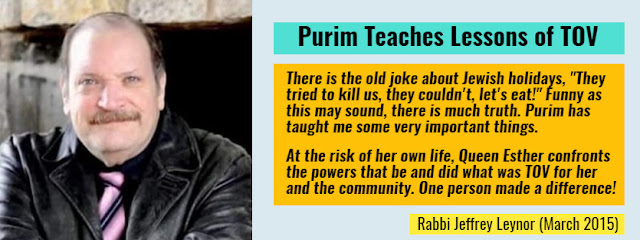(Purim
began at sundown yesterday and ends at sundown today. This article by Rabbi
Leynor was published on March 4, 2015.)
Tonight
is the beginning of Purim. There is the old joke about Jewish holidays, "They
tried to kill us, they couldn't, let's eat!" Funny as this may sound,
there is much truth. Purim has taught me some very important things. First, the
central characters are both male and female. If you don't know the story, get a
good translation of the Book of Esther
and enjoy. The story has TOV and RAH, good against evil, palace intrigue,
wonderful plot twists and turns and a surprise ending. The female lead, Queen
Esther, is beautiful, intelligent, creative and courageous. She has to hide her
Jewish identity for her own safety. (Sound familiar?) Actually, there were many
"Purims" in Jewish history. There were many Jewish communities that
were in danger of annihilation, but somehow those who held some power in the
greater community stepped forward and did what they had to do to save the
Jewish community.
In
the Purim story, which supposedly takes place in the ancient Persian Court, the
enemy of the Jews is named Haman. In many ways, he is the model for Hitler and
others whose intent was the destruction of the Jewish people. The male hero is
named Mordecai. He is the uncle of Esther. He understands the workings of the
court and involves himself in the government even foiling a plot to assassinate
the Persian King. He also mentors and guides Esther. She was not his biological
child, but was treated as a daughter and in return she brought him and everyone
untold blessings. My oldest son is not a biological child, but is very much my
son and brings me great blessing.
To
me, the climax of the story comes when Esther is told by Mordecai that she must
approach the King to cancel the decree, engineered by Haman, which stated that
on such and such a day, all the Jews in the empire could be slain and their
property confiscated. Esther is afraid. If the King doesn't accept her visit,
she could be executed. She came to realize unless she came forward, she, along
with her people would be killed. She not only rises to the occasion, but
creates a plan to destroy Haman.
So
what is TOV? At the risk of her own life, she confronted the powers that be and
did what was TOV for her and the community. Her actions Protected Life,
Preserved Life, Increased the Functionality of Life and Increased the Quality
of Life for her people. The King made another decree that the Jews could defend
themselves on the supposed day of their destruction and Haman was caught in a
plot that destroyed his power and his family.
God
is not mentioned in the story. It is the brave actions of those who have access
to power, coming forward to save the community at the peril of their lives. The
needs of the many outweigh the needs of the few. It is no different today, and
through human history. Those who stand up to RAH, evil, against the community
are the real heroes. Because evil always has a plan, TOV must be ready to
respond with actions which Create Light and Protect Life. As with many Jewish
holidays, it is considered a mitzvah to extend kindness to the poor and send
gifts of sweets to others. I wish you all a Happy Purim.
Do
TOV. Choose Life!
Rabbi Jeffrey Leynor

Comments
Post a Comment